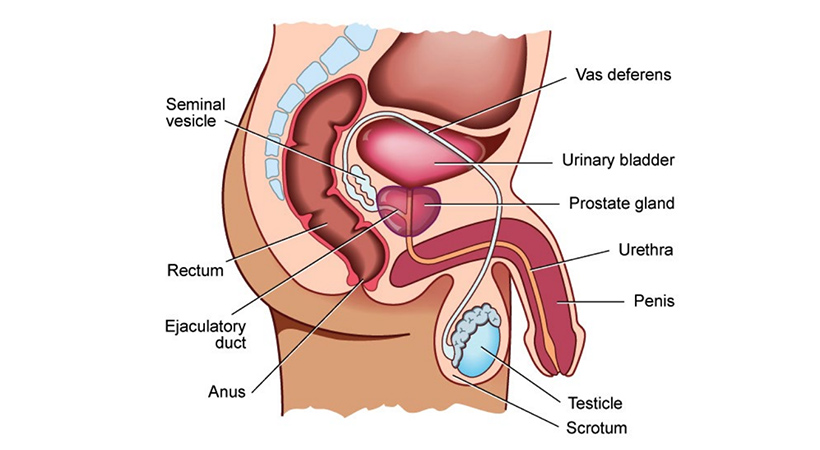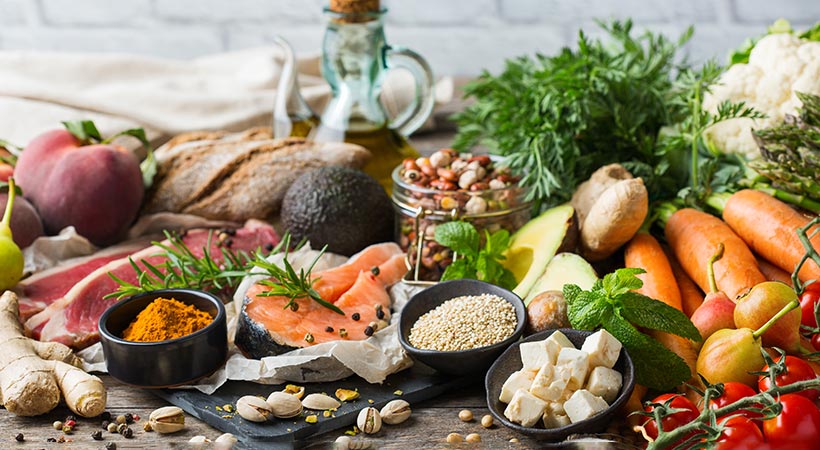Whether you know it or not, this wonderful little organ has been part of every load you’ve ever produced!
As a guy who has sex with guys (and/or girls — we know all about pegging), it’s possibly also blown your mind as the ‘male G-spot’. It’s the gland that keeps on giving, and we don’t know what we did to deserve it.
Getting the most out of your prostate can take a little practice and some self-care, but it’s well worth it. Luckily, we’ve done the research and put together these quick facts and handy tips for enjoying your prostate, now and into the future. You’re welcome.
1. The basics
The prostate is a gland that produces one of the main fluids which make up your semen. The muscles inside your prostate also help you to ejaculate, so it plays a key role in making you feel good during sex. Your prostate is about the size of a walnut and sits just behind the base of your penis (for cisgender men), below your bladder. Cis-men and trans-women also have prostates.
 Image credit: Prostate Cancer Foundation of Australia
Image credit: Prostate Cancer Foundation of Australia
2. Your prostate does its own orgasms, thx
Your prostate is part of semen production, but it’s not directly involved in every orgasm; it needs a little stimulation to really shine.
When you bottom, stimulating your prostate is one of the best parts of getting fucked. Along with the pelvic nerve, it gives you that powerful ‘internal’ orgasm which lights up your soul.
The best part is that you can do it completely hands free. You may not ejaculate (or even be hard) when you have a prostate orgasm, and you don’t necessarily need to touch your dick at all.
“… it’s possibly also blown your mind as the ‘male G-spot’.”
3. You’ve got milk
‘Milking’ your prostate is a less intense, but longer lasting way of enjoying it. Insert a (well lubricated) finger or sex toy inside your ass and push towards the front of your body. The prostate feels like a firm bulge or ‘nut’, and you’ll feel a sensation similar to the urge to piss when you get it.
From here, use a slow pulsing or massaging motion which brushes over or ‘clips’ the prostate. This will often cause it to produce fluid (which is why it’s called ‘milking’) without making you cum, and it can give you waves of slow-burn, pre-orgasmic sensation for hours. Fun with a friend.
4. You don’t need to bottom to enjoy it
If you‘re not down for penetration but still want that mind-blowing, prostate-boosted orgasm, you still have options. You can also stimulate your prostate by pressing on the soft part of your perineum (the ‘undercarriage’ between the balls and the anus).
You’ll know you’ve got it when you have that slight feeling like needing to piss, and you’ll possibly get a surging feeling in your dick and balls as well. Pushing on this spot while you’re having sex or masturbating brings in all of those internal nerves and can amplify (or even multiply!) your orgasm.
5. It’s a lifestyle
Research suggests that looking after your prostate is partly a lifestyle choice – specifically a ‘diet and exercise’ choice.
In a 2020 study of regions of the world with the lowest rates of prostate disease, diet and gut health were identified as significant contributors to prostate health. Men in these places generally drank a lot of green tea, ate fish and didn’t eat a lot of sugary or processed foods.
Other studies have linked the ‘Mediterranean diet’ of fish, ‘good’ fats (e.g. from olives and avocados) and plant-based proteins (like legumes and soy) to a reduced risk and slower progression of prostate cancer.

Exercise has also been suggested to reduce the risk of prostate disease. One study made a link between physical activity and decreased risk of prostate cancer, while others have made a slight correlation between obesity and the risk of prostate disease.
Yet perhaps the most exciting way to reduce the risk of developing prostate cancer could involve shooting your load more often!
6. Prostate issues are very common
About half of all men will have some sort of prostate issue by the time they’re 70. Part of this is because it’s normal for the prostate to grow larger as we age, which can cause complications with urine flow and/or sexual function.
While prostate cancer is the most common cancer diagnosis for men in Australia, it also has one of the highest survival rates of any cancer with over 95 per cent of men surviving for five years or more. Men more likely to be at risk are those with relatives who have had prostate cancer.
7. Prostate health issues usually have similar symptoms
The most common prostate problems are enlarged prostate, prostatitis (inflammation of the prostate) and prostate cancer. They all have very similar symptoms.
Bear in mind that many of these can be caused by the normal enlargement of the prostate as you age, but you should still talk to your doctor if you notice any changes:
- pissing more frequently
- difficulty pissing, or ‘dribbling’ instead of your normal stream
- having to get up at night to piss
- pain or burning when you piss
- pain when you ejaculate
- cloudy urine
- blood in your urine or cum (always see a doctor about this)
- pain in your scrotum, penis, testicles or rectum (inside your ass)
8. The biggest factor in prostate health is age
You can’t avoid getting older, but you can still stay on top of your prostate health.
Checking in with your doctor on your prostate health is one of the best ways to look after your gorgeous gland, especially for guys over 40. Make sure you get regular check-ups along with HIV and STI tests, and check out the resources at the Australian Prostate Cancer Foundation for more information.
If you’d like to speak to a gay-friendly doctor about your prostate health, we’ve put together a guide to finding one! Check it out here.